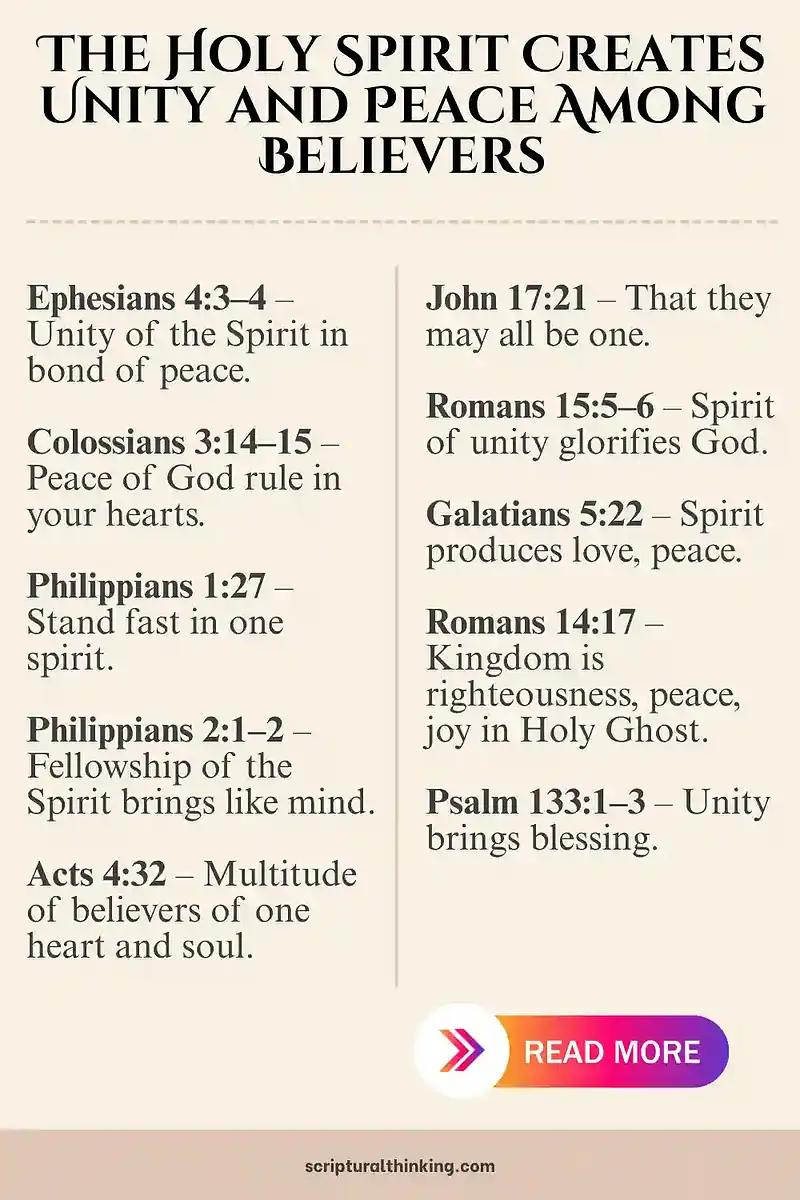One Spirit, One Body, One Bond of Peace
Brethren, the Spirit of God does not build walls. He builds bridges. The Scripture says, “Endeavouring to keep the unity of the Spirit in the bond of peace. There is one body, and one Spirit” (Ephesians 4:3-4).
One body – not many. One Spirit – not several opinions about Him. When the Spirit truly reigns, divisions fall like Jericho’s walls before the trumpet of truth. Where He is grieved, however, the house trembles, and peace departs.
“Above all these things put on charity, which is the bond of perfectness. And let the peace of God rule in your hearts” (Colossians 3:14-15). Love is not a suggestion – it is the very bond that holds the Church together.
Without it, even truth becomes harsh and brittle. The peace of God must rule, not merely visit. Does His peace rule in your heart – or does pride and hurt occupy the throne?
Standing Fast Together
The Apostle pleaded, “Stand fast in one spirit, with one mind striving together for the faith of the gospel” (Philippians 1:27). Unity does not mean silence; it means standing shoulder to shoulder under the banner of Christ. Soldiers of the cross cannot fight each other and still claim to fight for Him.
“If there be therefore any consolation in Christ… if any fellowship of the Spirit… be likeminded, having the same love, being of one accord, of one mind” (Philippians 2:1-2). The fellowship of the Spirit is not a club – it is a miracle. It turns selfish hearts into servants. It makes strangers family. O my soul, what power it is when hearts once cold now beat together in love!
One Heart, One Soul
In the book of Acts we read, “The multitude of them that believed were of one heart and of one soul” (Acts 4:32). That’s not organization – that’s transformation. The Spirit welded their hearts together through prayer, generosity, and shared purpose.
And what did Jesus pray before the cross? “That they all may be one; as thou, Father, art in me, and I in thee” (John 17:21). This unity is not man-made – it’s heaven-breathed.
The Father and the Son are never in competition. They are one in purpose, one in will, one in love. And Jesus said, “Let My people be the same.” How can we resist that prayer and still claim to love Him?
The God of Peace and Patience
“Now the God of patience and consolation grant you to be likeminded one toward another according to Christ Jesus; that ye may with one mind and one mouth glorify God” (Romans 15:5-6). Unity is not for our comfort; it’s for His glory.
One mind, one mouth – singing the same hallelujah to the same Savior! When the Spirit unites us, worship becomes thunderous, not because of volume, but because of harmony.
“The fruit of the Spirit is love, joy, peace” (Galatians 5:22). “For the kingdom of God is not meat and drink; but righteousness, and peace, and joy in the Holy Ghost” (Romans 14:17). The Spirit’s fruit is not competition; it’s communion. The Spirit’s kingdom is not about arguing opinions; it’s about righteousness and peace.
“Behold, how good and how pleasant it is for brethren to dwell together in unity!” (Psalm 133:1-3). It’s not just good – it’s pleasant. It’s like the anointing oil on Aaron’s beard, running down to the skirts of his garments. That oil represents the Spirit’s anointing. Where unity flows, the Spirit flows.
Love: The Mark of True Discipleship
Jesus said, “A new commandment I give unto you, That ye love one another… By this shall all men know that ye are my disciples” (John 13:34-35). Not by eloquent preaching. Not by doctrinal arguments. By love!
The Spirit gives that love. “The love of God is shed abroad in our hearts by the Holy Ghost which is given unto us” (Romans 5:5). It spills over, healing wounds, reconciling enemies, and quieting storms.
Baptized into One Body
Paul wrote, “By one Spirit are we all baptized into one body” (1 Corinthians 12:12-13). Every believer, no matter their background, is brought into the same Body. That means there’s no room for racism, elitism, or favoritism.
The Spirit tears down what the flesh builds up. Through the Spirit, the Church becomes a living temple, not a collection of stones, but a single dwelling for God Himself.
Christ Our Peace
“For he is our peace, who hath made both one… and that he might reconcile both unto God in one body by the cross… For through him we both have access by one Spirit unto the Father” (Ephesians 2:14-18).
At Calvary, peace was purchased. By the Spirit, peace is applied. The cross removed the wall; the Spirit keeps it down. Jew and Gentile, slave and free, male and female – all are one in Christ Jesus.
Living Out Unity
“Be ye all of one mind, having compassion one of another, love as brethren” (1 Peter 3:8-9). Compassion glues what pride would tear apart. “Be of one mind, live in peace; and the God of love and peace shall be with you” (2 Corinthians 13:11). Where peace reigns, God abides. Where strife rules, His presence withdraws.
“Restore such an one in the spirit of meekness… Bear ye one another’s burdens” (Galatians 6:1-2). To restore is harder than to criticize. But the Spirit makes it possible. “Let no corrupt communication proceed out of your mouth… And grieve not the holy Spirit of God… be kind one to another, tenderhearted, forgiving one another” (Ephesians 4:29-32). Harsh words grieve the Spirit. Forgiveness invites Him back in.
The Spirit of Peace in Daily Life
“Be at peace among yourselves… See that none render evil for evil” (1 Thessalonians 5:13-15). The Spirit calls us to peacemaking, not payback. “The wisdom that is from above is… peaceable, gentle… And the fruit of righteousness is sown in peace of them that make peace” (James 3:17-18). God’s wisdom always plants peace. The devil’s wisdom plants discord.
Even Isaiah foresaw it: “The work of righteousness shall be peace; and the effect of righteousness quietness and assurance for ever” (Isaiah 32:17-18). When the Spirit rules, rest replaces restlessness.
Sealed and Alive Together
“He which stablisheth us with you in Christ… hath also sealed us, and given the earnest of the Spirit in our hearts” (2 Corinthians 1:21-22). That seal marks us as one family.
The same Spirit that sealed me sealed you. We belong to the same household of faith. “If any man have not the Spirit of Christ, he is none of his… the Spirit is life” (Romans 8:9-11). The Spirit is our shared life-breath. Without Him, unity is a theory; with Him, it becomes reality.
The Call to Preserve the Unity
So, friends, what divides us? Pride? Preference? Personality? The Spirit has already made us one; we are called only to keep it. The world will know Christ not by our platforms but by our peace. The Spirit cries still – “Endeavour to keep the unity of the Spirit in the bond of peace.” Will we grieve Him or yield to Him?
O my soul, choose peace. Choose unity. Choose love.
For where the Spirit of the Lord is, there is liberty – and there is peace.
Call to Action: The Question That Demands an AnswerIn Acts 2:37 Peter and the Apostles were asked the question – What Shall We do? And in Acts 2:38 Peter answered, Repent, and be baptized every one of you in the name of Jesus Christ for the remission of sins, and ye shall receive the gift of the Holy Ghost. For the promise is unto you, and to your children, and to all that are afar off, even as many as the Lord our God shall call. Do you understand this? After hearing the gospel and believing, they asked what should would do. The answer hasn’t changed friend, Peter clearly gave the answer. The question for you today is, Have you receieved the Holy Spirit Since you believed? If you’re ready to take that step, or you want to learn more about what it means to be born again of water and Spirit, visit: Come, and let the Spirit make you new. |

